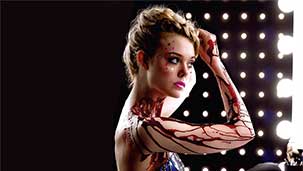You were waiting with the rep in the lobby of the multiplex, tall and languid, wearing a perfectly-fitted Chanel dress, red lips perfectly limned. After each critic signed in, you escorted us to the boxy theatre for our screening Of Neon Demon. At first it struck me as gauche nonsense. Now though, it seems a bit of genius.
I don’t have a clue how the others felt about this. Perhaps they saw it as a typically NWR (the monogram of Nicholas Winding Refn, ostentatiously displayed throughout the opening credit sequence) both pandering and contemptuous. Retroactively, for me at least, it was a remarkably astute piece of theatrics—a stunt that prompted me to think about the questions Neon Demon would raise, again and again, and again.
Why is physical beauty—however it’s presently defined or marketed—given such currency in human society? Is its value entirely transactional or is there a way to see beauty as art that transcends the physical component? Is it necessarily true that we always, as a society, devour that which we elevate?
I’m not going to spend a lot of time trying to describe what I saw on screen other than to say if someone is at all interested in a remarkably blunt instrument painting a beautiful picture they should see this film. High fashion’s denizens have never looked so baldly unattractive, despite being so well lit.
Neon Demon is the apex of NWR: vulgar, sometimes achingly beautiful, direct to the point of being odious, filled with images that, depending on how you squinted at them, and what your political leanings are, were either pornographic or transgressive. Like VonTrier, NWR seems to go out of his way to make all of us view our unadorned id’s in vivid color. But it’s a film that sticks with you long past the end credits, as much for the questions it raises, as for the indelible (and often profoundly uncomfortable) images it leaves you with.
When the film ended I walked out of the theatre, feeling a bit like I had been beaten with a bar of soap in a rolled up towel. There was an after show reception in the theatre restaurant which I had no interest in attending. Until I saw you and your fellow hostess, Caroline, handing out wine.
I spent the next twenty minutes or so talking to you about the film and whether or not you felt it was an accurate—if obviously heightened and sometimes allegorical—depiction of a world you are both a part of. It was a fascinating conversation and I was struck (perhaps naively) at how clear-eyed you are about the often seedy nature of the business you were in. You mentioned an early scene with Christina Hendricks—as a Svengali of sorts—who appraises Elle Fanning with a predatory eye. But you saw the scene entirely differently than I did. Instead of a person who would ruthlessly exploit your beauty, you saw a gatekeeper and perhaps a kind of facilitator. At worst an impediment, at best a kind of catapult to help you clear a particular fence.
There was another scene (one I found far more disturbing than Neon Demon’s cannibalism or necrophilia) where a group of models are paraded in front of a designer in nothing but their underwear. The complete and utter dehumanization of the women as they are dissected and discarded (in this case metaphorically) was so starkly wrought it made me nauseous. It was like watching your best friend bomb on open mike night in front of a crowd of professional hecklers.
But what you saw was that Elle Fanning was unreasonably robust and would have never even made it past the initial screening process. The ludicrousness of that truth alone should give everyone who has ever bought, and consumed, fashion magazines, pause. But for you it was an institutional truth, like weight classes for boxers.
I tend to think most of us are dishonest when we talk out loud about how affecting physical beauty can be. I have seen smart women struck dumb and kind men turned into wolves. But you seemed remarkably sanguine about the cruel, transactional truths that underpin your industry. And you left me with this as you glided off to serve more wine to sweaty, nervous man-children:
“The perks outweigh the downside.”
Sincerely,

Tim







